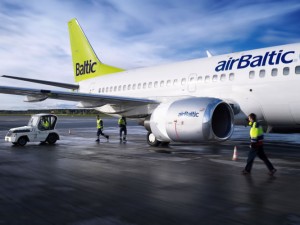RIGA — The Latvian government agreed in principle today to a bailout plan for the country’s national airline carrier airBaltic amid fears the debt-ridden company could face bankruptcy by the end of the year.
The company had sought to increase its share capital from 500,000 lats (€713,973,000) to 30 million lats after suffering heavy losses last year.
Under the plan, the government will issue convertible bonds, which will be purchased by the Latvian State Radio and Television Center (LVRTC), thus retaining state control over 52.6 percent of the airline’s shares.
LVRTC’s financial assets, required to increase the airline’s share capital, are currently deposited with Parex Bank, itself the subject of a government rescue plan late last year.
Janis Vanags, airBaltic vice president of corporate communications, welcomed today’s decision. Vanags said the plan would allow the airline to proceed with future investment programs, including the purchase of new bombardier aircraft as part of a 99.56 million lat (€142 million) fleet expansion plan.
“We have reiterated for some years that a capital increase is absolutely necessary to ensure the future development of the company,” Vanags told Baltic Reports.
A capital increase is typically sought in case of negative capital results, to protect future operations or when significant future investment is expected. The parties involved have so far declined to comment on the specific amount agreed as capital increase, and airBaltic also declined to comment on its 2008/2009 financial results, saying data had yet to be publicly released. However, according to local media reports airBaltic finished last year with a negative capital at -25.27 million lats, and in recent months had defaulted on a loan taken with SEB Bank.
The airline’s financing problems also resulted in increased speculation about the company’s solvency. Under the terms of the government agreement the airline will need to channel profit from 2009 and 2010 into increasing its share capital. Vanags told Baltic Reports the airline was on track to making a profitable turnover this year. He said the company’s decision earlier this year to change from a point-to-point carrier to hub operations in a bid to boost profitability was paying off. “Fifty percent of our passengers are now transit passengers,” he said. “Given that there is this economic meltdown people are really looking at what is the cheapest option. We are actually in a very good position given that we offer very attractive prices and fantastic connections. Despite the global downturn in the aviation industry we have actually experienced sustained growth,” Vanags said.
The airline’s principal shareholders are the state of Latvia with 52.6 percent of shares and the company Baltijas aviācijas sistēmas, owned by the airBaltic’s CEO and president Bertolt Flick, with 47.2 percent of the shares.













